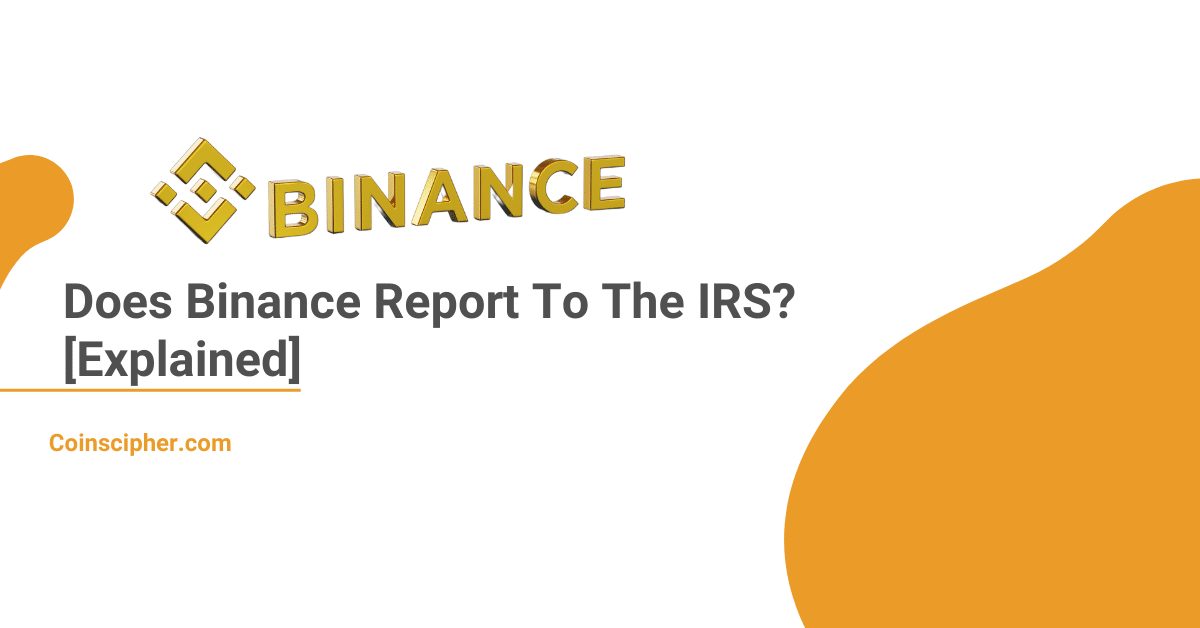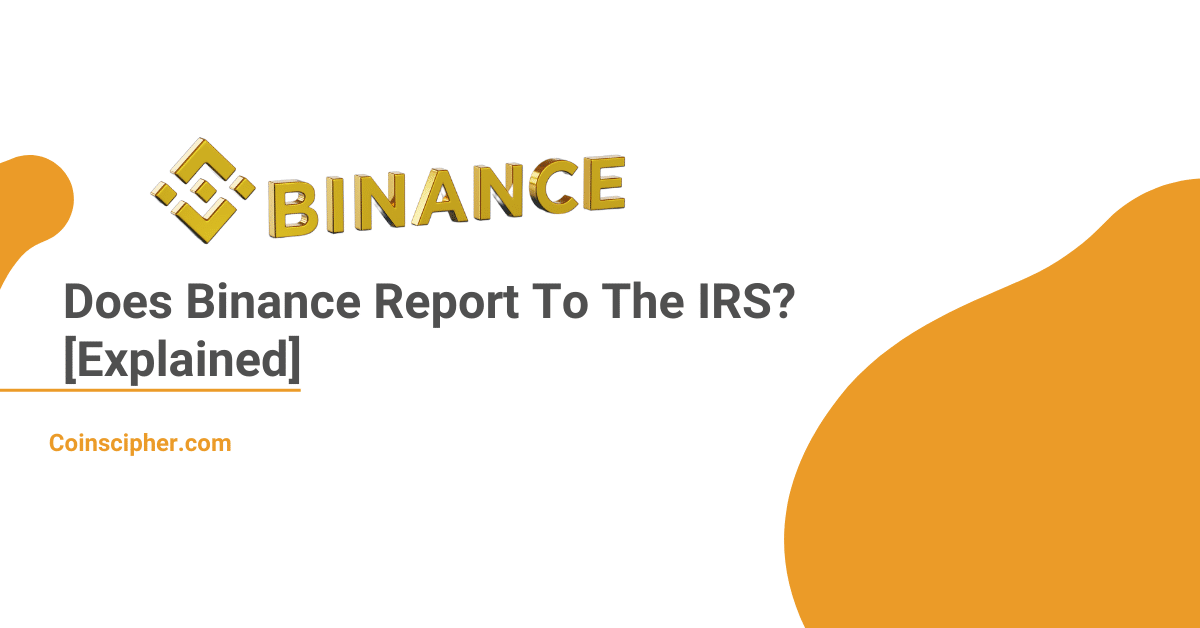
Today, we aim to shed light on a question that many cryptocurrency enthusiasts have pondered: does Binance report to the IRS? As the popularity of digital currencies, such as Bitcoin and Ethereum, continues to soar, regulators are increasingly focusing on ensuring compliance with tax laws.
Let’s dive in and decipher the intricacies surrounding Binance’s reporting practices in relation to the IRS.
Key Takeaways
- Is Binance accountable to the IRS? Given that Binance has ceased its services to users in the United States, it does submit reports to the IRS, but there are some limitations.
- Binance US provides Forms 1099-MISC to those traders who have gained in excess of at least $600 through staking, rewards, or comparable programs on its platform.
Does Binance Report To The IRS?
Indeed, Binance US, like other crypto exchanges operating within the U.S. jurisdiction, is obligated to inform the Internal Revenue Service (IRS) about certain cryptocurrency transactions that exceed a particular monetary value. This is in line with the financial regulations that govern transactions in the U.S.
The IRS is actively striving to ensure that all cryptocurrency-related income and transactions are reported correctly. This effort is part of the wider initiative to improve compliance within the rapidly growing cryptocurrency sector.
More than transaction reporting, Binance US also provides its users with appropriate tax documents, including Form 1099-K, to assist them in reporting their cryptocurrency income accurately during tax season. These steps taken by Binance US are a testament to the evolving framework of regulatory compliance in the cryptocurrency domain.
As an investor specializing in cryptocurrencies, the utilization of a variety of platforms, exchanges, and wallets, including but not limited to Binance US, Coinbase, and Metamask, is an anticipated part of the investment landscape.
Nonetheless, it’s noteworthy that the tax reporting feature of Binance is designed to encompass only the activities transpiring within its own platform. Therefore, this fails to take into account transactions occurring on other wallets, exchanges, or within decentralized finance (DeFi) protocols.
Consequently, this may result in a deficit of comprehensive information regarding your capital gains, losses, and income tax associated with the full spectrum of your cryptocurrency investments.
What Does Binance US Report To The IRS
Binance.US, the partner company of Binance that serves American users, reports to the Internal Revenue Service (IRS) when a customer earns more than $600 through income-generating activities such as staking and referrals. In such cases, Binance.US issues a Form 1099-MISC and files an identical copy with the IRS.
How are my Binance transactions taxed?
The taxation of your Binance transactions is contingent upon your fiscal domicile since tax regulations regarding cryptocurrencies can vary greatly from one jurisdiction to another.
The nature of your engagement with cryptocurrencies – whether you’re an occasional investor or an active trader – often dictates the taxation of your transactions. For casual investors, capital gains or losses resulting from cryptocurrency transactions may be the norm, as exemplified by U.S. taxpayers using Binance US.
On the other hand, active traders might find their cryptocurrency profits subjected to ordinary income tax rates, a scenario that, once again, is dependent on local tax laws. For instance, professional traders in the U.S. who are trading or accruing other forms of crypto income can expect to pay standard income tax rates on their profits.
As for the question, “Does Binance report to the IRS?” – the answer is no. Nonetheless, Binance US, which caters to users based in the United States, does indeed report to the IRS.
Binance US Taxes Types
In the United States, Binance users are typically liable for two types of taxes: capital gains tax and ordinary income tax. Let’s delve into each of these categories and provide some additional insights.
Capital Gains Tax
This tax pertains to the profit earned from selling an asset, including stocks and cryptocurrencies like those traded on Binance. It is calculated by determining the difference between the selling price and the original purchase price.
Ordinary Income Tax
In the world of cryptocurrency, ordinary income tax applies when you receive crypto without providing any consideration. Examples of such instances include crypto mining or receiving airdrops.
For ordinary income tax purposes, the fair market value of the cryptocurrency at the time you received it is what you must report. Determining the accurate fair market value can be crucial, as it forms the basis for calculating your tax liability.
Does Binance Report Also in Asia?
Yes, Binance has taken steps to improve compliance with regulatory bodies globally, including in Asia and Europe. As part of this initiative, Binance has launched a tax reporting tool to track cryptocurrency trading activities on its platform, and it also plans to share some user data with regulators to ensure users meet their legal obligations.
However, the specifics of Binance’s data-sharing practices can vary from country to country, depending on local laws and regulations. It’s important to note that while Binance is cooperating with regulators, the regulatory landscape for cryptocurrencies is still evolving in many countries, and the specifics can be complex and subject to change.
Binance Overview
Binance is a prominent global cryptocurrency exchange and blockchain platform. It offers a platform for trading over 500 cryptocurrencies and is known for its broad range of cryptocurrencies, high liquidity, and low transaction fees. In addition to its exchange, Binance also provides services such as an educational platform (Binance Academy), a charity foundation, and a blockchain project incubator (Binance Labs).
The company has its own blockchain, Binance Chain, and a decentralized exchange, Binance DEX. Binance Coin (BNB), the native cryptocurrency of Binance, is used for various purposes within the Binance ecosystem and is among the top cryptocurrencies by market capitalization.
To Wrap Up
Binance’s reporting practices vary depending on geographical jurisdiction.
In the U.S., Binance ceased its services, resulting in limited reporting to the IRS. However, Binance US, the partner company serving American users, adheres to U.S. financial regulations and reports certain transactions exceeding a specified value to the IRS and Taxes Authorities. This includes providing Form 1099-MISC to traders who gain over $600 through staking or similar programs. However, reporting is limited to transactions within Binance’s platform, potentially leading to a lack of comprehensive information on capital gains, losses, and income tax associated with broader cryptocurrency investments.
Taxation of Binance transactions depends on fiscal domicile and engagement level with cryptocurrencies. U.S. users of Binance US might be liable for capital gains tax and ordinary income tax, while professional traders can expect to pay standard income tax rates. Binance does not report to the IRS, but Binance US does for its U.S.-based users.
Outside the U.S., Binance works on compliance with global regulatory bodies. It has implemented a tax reporting tool to track trading activities on its platform and plans to share user data with regulators, although specifics vary based on local laws and regulations.




